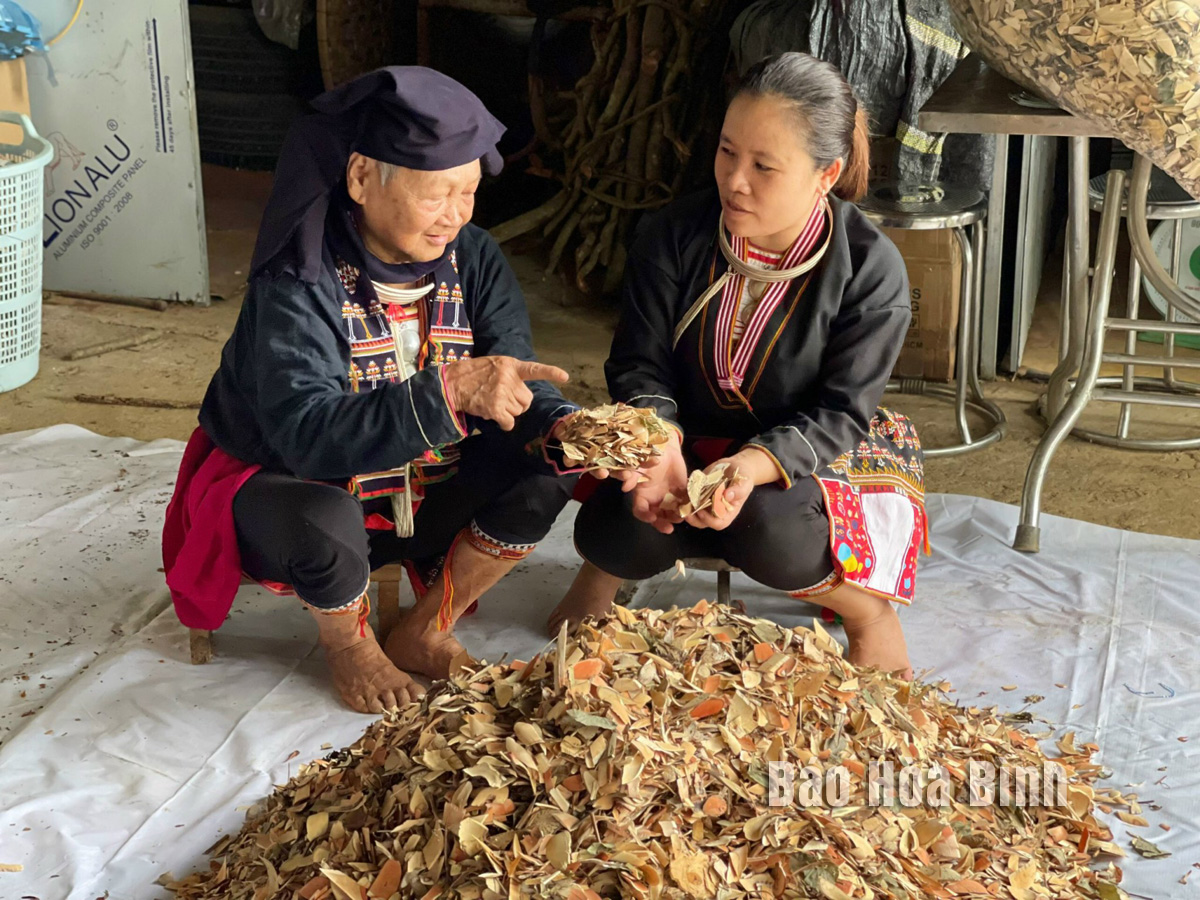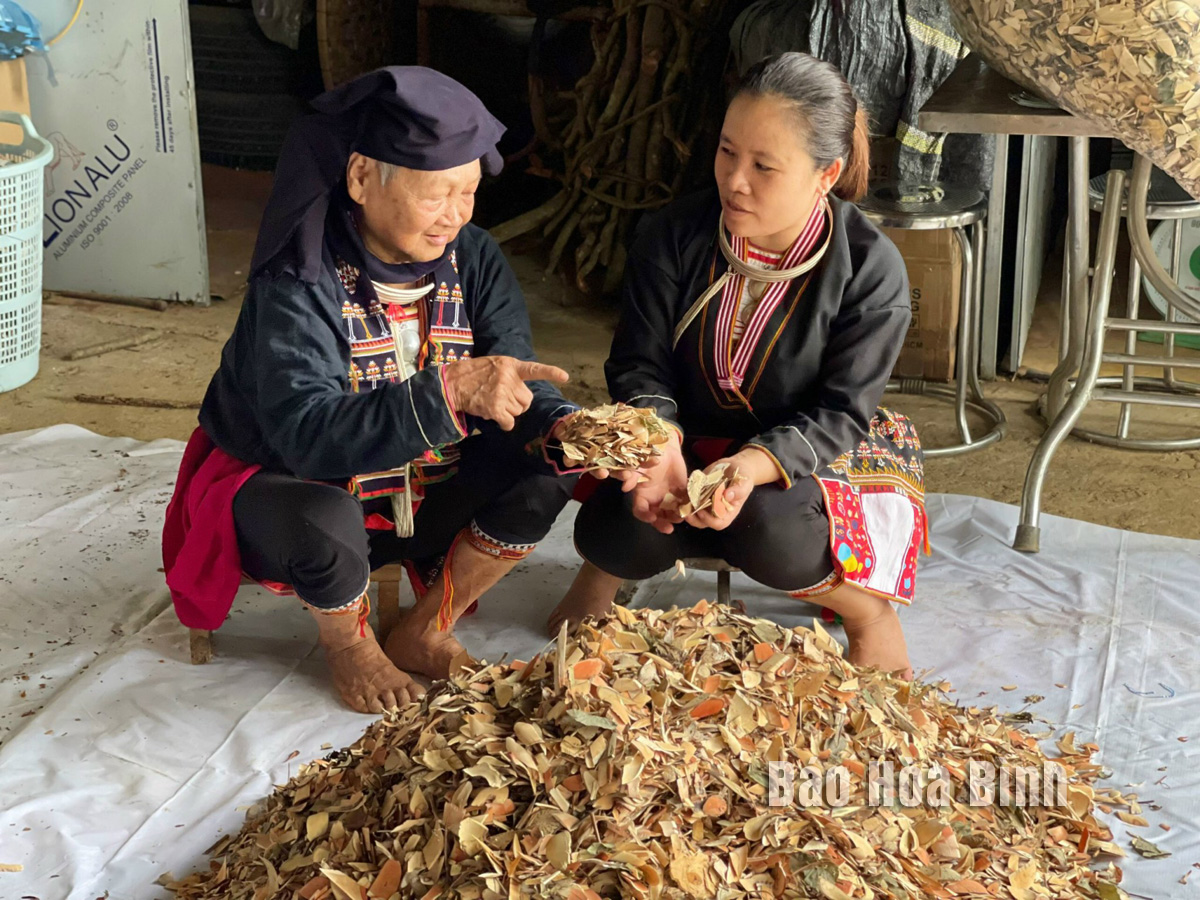
Hoa Binh currently has 123 medicinal herb products recognised by OCOP (One Commune-One Product) Programme items, affirming the locality’s prestige and trademark in the market.
Developing the traditional medicine of the Dao people, Ngoc Sang Cooperative in Bac Phong commune, Cao Phong district has successfully produced Ngoc Sang black turmeric product.
Xa den (Celastrus hindsii Benth) and Ca gai leo (Solanum trilobatum Linn jelly products of the Tuyet Nhi Cooperative in Cao Duong commune of Luong Son district are among 24 OCOP products rated with four stars of Hoa Binh in 2022. The products are used to treat a number of liver diseases and inflammation, detoxify the body, prevent cancer, and aid cancer treatment. With an abundant material supply source, the cooperative has successfully produced the products, meeting customers’ demands.
Along with these products, Hoa Binh also has many famous medicinal herbal product brands, including Yen Thuy Ca gai leo jelly, Ca gai leo tea bags, and Nhung Van turmeric starch.
All the products have been certified to have good effects on people’s health, with ensured production process and clear origin.
Recognising the province’s advantages, localities across Hoa Binh have focused on developing herbal plant farms and processing medicinal herbs following traditional recipe. In 2023, many new OCOP products in the field of medicine have been recognised.
Bui Van Dan, head of the Agriculture and Rural Development Division of Cao Phong district, said that Dao ethnic minority people in Bac Phong commune have kept many effective traditional medicine recipes, including the use of Nghe den (Curcuma zedoaria) to treat digestive diseases. Basing on the recipe, Ngoc Sang Cooperative has successfully researched and produced Curcuma zedoaria jelly to provide to the market.
The cooperative has cooperated with local farmers to develop a 10-hectare Curcuma zedoaria material region, which has improved economic situation in the locality. Local authorities have assisted the cooperative to expand its production by developing the farming areas of other herbs that can combine with Curcuma zedoaria to make traditional medicine, said Dan.
In 2018, the People’s Committee of Hoa Binh issued Decision No. 3119/QD-UBND approving a project to develop medicinal plants in Hoa Binh province until 2025 with a vision to 2030.
Accordingly, the province has focused on designing planning for forest and natural herbal plant areas to preserve the endemic, indigenous, valuable, and endangered genetic resources serving sustainable development, while selecting and reasonably exploiting 10 kinds of herbal plants with a volume of 8,000-9,000 plants each year.
Meanwhile, Hoa Binh plans to build four conservation areas of Hang Kia, Pu Canh, Thuong Tien, and Ngoc Son, which are expected to become areas to grow many medicinal plant species collected in different localities, serving scientific research and development of medicinal materials. Hoa Binh aims to conserve 70% of typical local medicinal species by 2025 and 100% by 2030.
Four incubation will be built to provide medicinal varieties for the needs of large-scale medicinal planting and development in four districts of Tan Lac, Lac Thuy, Yen Thuy, and Lac Son. This is an important premise for the province to develop OCOP medicinal products.
The provincial agricultural sector has asked districts and cities to focus on building preferential policies for the production and selling of medicinal herbs and herbal medicine products, and supporting local firms in applying high technologies during the research, and production of herbal medicine products./.
According to data from the Hoa Binh Provincial Party Committee, the industrial production index for the first six months of 2025 is estimated to have increased by 20% compared to the same period last year. This marks the highest year-on-year growth rate for this period since 2020.
In the first six months of 2025, Hoa Binh province’s export turnover was estimated at 1.145 billion USD, marking an 18.11% increase compared to the same period in 2024. Import turnover was estimated at $ 804 million, a 17.15% increase, which helped the province maintain a positive trade balance.
The lives of the ethnic minority farmers in Tan Lac district have gradually improved thanks to the new directions in agricultural production. This is a testament to the collective strength fostered through the professional associations and groups implemented by various levels of the district’s Farmers’ Union.
With the motto the "product quality comes first,” after nearly one year of establishment and operation, Muong village’s Clean Food Agricultural and Commercial Cooperative, located in Cau Hamlet, Hung Son Commune (Kim Boi district), has launched reputable, high-quality agricultural products to the market that are well-received by consumers. The products such as Muong village’s pork sausage, salt-cured chicken, and salt-cured pork hocks have gradually carved out a place in the market and they are on the path to obtaining the OCOP certification.
In the past, the phrase "bumper harvest, rock-bottom prices" was a familiar refrain for Vietnamese farmers engaged in fragmented, small-scale agriculture. But today, a new spirit is emerging across rural areas of Hoa Binh province - one of collaboration, organisation, and collective economic models that provide a stable foundation for production.
Maintaining growing area codes and packing facility codes in accordance with regulations is a mandatory requirement for agricultural products to be eligible for export. Recently, the Department of Agriculture and Environment of Hoa Binh province has intensified technical supervision of designated farming areas and packing facilities to safeguard the "green passport" that enables its products to access international markets.



